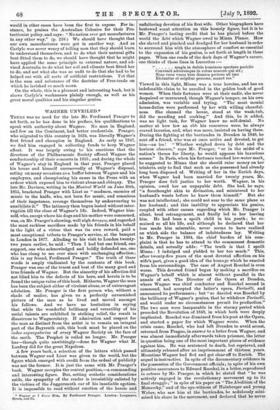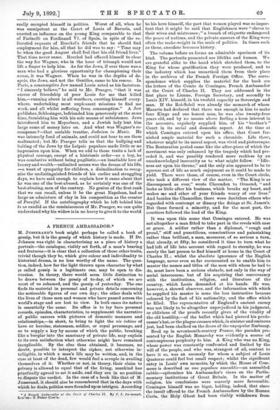WAGNER UNVEILED.*
THERE was no need for the late Mr. Ferdinand Praeger to set forth, as he has done in his preface, his qualifications to speak with authority about Wagner. No man in England, and few on the Continent, had better credentials. Praeger, who migrated to this country in 1834, was literally Wagner's first friend and champion in England. As early as 1847, we find him engaged in collecting funds to keep Wagner afloat. It was largely owing to his exertions that the directors of the Philharmonic Society offered Wagner the conductorship of their concerts in 1855; and duriag the whole of Wagner's stay in England in that year, Praeger placed his house and himself unreservedly at Wagner's disposal, acting on many occasions as a buffer between Wagner and his employers, and championing his cause in the Press with an ardour which exposed him to violent abuse and obloquy. The late Mr. Davison, writing in the Musical World on June 30th, 1855, bracketed Praeger with Liszt as "madmen, enemies of music to the knife, who, not born for music, and conscious of their impotence, revenge themselves by endeavouring to annihilate it." The intimacy then began lasted without inter- ruption till the close of Wagner's life. Indeed, Wagner him- f3el1, who, except where his dogs and his mother were concerned, was, on Mr. Praeger's showing, well nigh claTopy6;, and regarded the most reckless sacrifices made by his friends in his behalf in the light of a virtue that was its own reward, paid a most exceptional tribute to Praeger's service, at the banquet in London in 1877. Alluding to his visit to London twenty- two years earlier, he said : "Then I had but one friend, one support, one who acknowledged and boldly defended me, one who has clung to me ever since with unchanging affection; this is my friend, Ferdinand Praeger." The truth of these words is amply vindicated by the contents of this book. Praeger was one of the truest and best of the many good and true friends of Wagner. Bat the sincerity of his affection did not blind him to the defects of his hero, and herein is to be found the unique value of this book. Hitherto, Wagner the man has been the subject either of virulent abuse, or of extravagant adulation. Mr. Praeger is the first person who, without a shade of malice, has given us a perfectly unvarnished picture of the man as he lived and moved amongst his fellows. And we have no hesitation in saying that while the wonderful brilliancy and versatility of his social talents are exhibited in striking relief, the result is disastrous to Wagnerolatry. If admiration and respect for the man as distinct from the artist is to remain an integral part of the Bayreuth cult, this book must be placed on the index expurgatorius of every Wagner Society on the face of the earth. The Prophet is veiled no longer. Mr. Praeger has—though quite unwittingly—done for Wagner what M. Lanfrey did for the great Napoleon.
A few years back, a selection of the letters which passed between Wagner and Liszt was given to the world, but the figure which emerged with credit from the ordeal of publicity was not the former. It is just the same with Mr. Praeger's book. Wagner occupies the central position,—a commanding and interesting figure. But, setting wsthetic considerations aside, the sympathy of the reader is irresistibly enlisted by the victims of the Juggernauth car of his insatiable egotism. It is impossible to read without emotion of the heroic and
* Wagner as I Knew Rim. By Ferdinand Praeger. London : Longmans, Green, and Co.
unfaltering devotion of his first wife. Other biographers have bestowed scant attention on this homely figure, but it is to Mr. Praeger's lasting credit that he has placed before the world the debt which Wagner owed to Minna Planer. How she slaved and pinched and drudged for her husband in order to surround him with the atmosphere of comfort so essential to the expansion of his genius, is set forth at length in these pages. When one reads of the dark days of Wagner's career, one thinks of those lines in Lucretius
magis in dubiis bominem spectare periclis
Convenit adversisque in rebus noscere qui sit ; Nam vera3 voces turn demum pectore ab imo Eiciuntur et eripitur persona, manet res."
Viewed in this light, Minna was a true heroine, and has an indefeasible claim to be enrolled in the golden book of good
women. When their fortunes were at their nadir, she never despaired or murmured, though Wagner's temper, on his own admission, was variable and trying. "The most menial house-duties were performed by her with willing cheerful- ness. She cleaned the house, stood at the wash-tub, did the mending and cooking." And this, be it added, was no light task, for Wagner knew no self-denial. No matter at how low an ebb his resources were, he always craved luxuries, and, what was more, insisted on having them.
During the fighting at the barricades in Dresden in 1848, he
sent off a friend, who was at once active and devoted, to get him—an ice ! "Whether weighed down by debt and the horizon obscure," says Mr. Praeger, "or in the midst of a
nation's throes for liberty, he would appease his luxurious senses." In Paris, when his fortunes touched low-water mark, he suggested to Minna that she should raise money on her trinkets, only to find that such as she possessed had already long been disposed of. Writing of her in the Zurich days, when Wagner had been married for twenty years, Mr. Praeger does full justice to her worth. Wagner, in his opinion, owed her an unpayable debt. She had, he says, "a forethought akin to divination, and ministered to her husband's wants before he knew them himself." But she was not intellectual ; she could not soar to the same plane as her husband ; and this inability to appreciate his genius, coupled with other causes regarding which Mr. Praeger is silent, bred estrangement, and finally led to her leaving him. He had been a spoilt child in his youth ; he re- mained so all his life, and although he declared that her loss made him miserable, never seems to have realised on which side the balance of indebtedness lay. Writing to Mr. Praeger in 1864, the chief burden of his com- plaint is that he has to attend to the commonest domestic details, and actually adds : "The truth is that I spoilt Minna : I indulged and yielded to her too much." This, after twenty-five years of the most devoted affection on his wife's part, gives a good idea of the homage which he exacted from his surroundings. The case of August Roeckel is even worse. This devoted friend began by making a sacrifice on Wagner's behalf which is almost without parallel in the annals of art. The Director of the Opera at Dresden,
where Wagner was chief conductor and Roeckel second in command, had accepted the latter's opera, Farinelli, and
announced its performance ; but "so dazzled was Roeckel by
the brilliancy of Wagner's genius, that be withdrew Farinelli, and would under no circumstances permit its production."
The two men were inseparable in the stormy period which preceded the Revolution of 1848, in which both were deeply implicated. Roeckel was dismissed from his post at the Opera, and started a paper for which Wagner wrote. When the crisis came, Roeckel, who had left Dresden to avoid arrest, returned from Prague, in answer to a letter from Wagner, and was almost immediately afterwards taken prisoner, the letter in question being one of the most important pieces of evidence against him. He was sentenced to death, but reprieved, and ultimately released after an imprisonment of thirteen years. Meantime Wagner had fled and got clear off to Zurich. The
sequel is instructive. In spite of the documentary evidence in the possession of the Government officials; in spite of his own positive assurances to Edward Roeckel, in a letter, reproduced in extenso by Mr. Praeger, in which he stated that "he was
actively engaged in the revolutionary movement up to its final struggle ; " in spite of his paper on "The Abolition of the Monarchy," and of the eye-witness of Hainberger and young Weber, who saw him at the barricades, he sedulously mini- mised his share in the movement, and declared that he never really occupied himself in politics. Worst of all, when he was omnipotent at the Court of Louis of Bavaria, and exerted an influence on the young King comparable to that of Farinelli on Ferdinand VI. of Spain, in spite of the re- iterated requests of Roeckel's friends that he should find employment for him, all that he did was to say; "Time may be when the good August shall feel that his old friend lives." That time never came. Roeckel had effaced himself to clear the way for Wagner, who in the hour of triumph would not lift a finger to help him. As for the Jews, if ever there was a man who had a glorious opportunity for championing their cause, it was Wagner. When he was in the depths of de- spair, the Jews, and not the Gentiles, came to his rescue. In Paris, a consumptive Jew named Louis acted as his factotum.
I sincerely believe," he said to Mr. Praeger, "that it was excess of friendship of poor Louis for me that killed him,—running about in all weathers, exerting himself every- where, undertaking most unpleasant missions to find me work, and all whilst suffering from consumption." A Jew publisher, Schlesinger, befriended him generously at the same time, furnishing him with his sole means of subsistence. Jews introduced him to Meyerbeer, and a Jewish lady lent him large sums of money later on. And what was Wagner's re- compense P—that amiable treatise, Judaism in Music. He was intensely fond of animals, and could not bear to see them maltreated ; but Mr. Praeger tells us that the bullying and baiting of the Jews by the Leipsie populace made little or no impression upon him. When we add to these traits a lack of physical courage, except of a histrionic order—as a boy, he was combative without being pugilistic,—an insatiable love of luxury and wealth—unlimited means was the dream of his life, —a want of sympathy for children, a disinclination to recog- nise the undistinguished friends of his earlier and struggling days, we have said enough to explain how it came about that he was one of the best-abused, as he certainly was one of the best-abusing, men of the century. No genius of the first rank that we can recall, unless it be the great Napoleon, had so large an admixture of clay in his composition as the creator of Pars;fal. If the autobiography which he left behind him is as candid as the reminiscences of Mr. Praeger, we can quite understand why his widow is in no hurry to give it to the world



















































 Previous page
Previous page